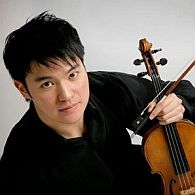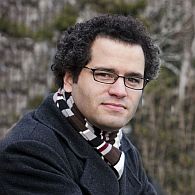
Ray Chen Rocks Music Hall with CSO Debut

Ray Chen
|

Andrew Grams
|
They don’t come more heralded than violinist Ray Chen.
In addition to a sheaf of competition victories, including the 2009 Queen Elizabeth (of Belgium) Violin Competition, Chen, 22, has an exclusive recording contract with Sony and won Germany’s highest record award (ECHO Klassik) for his debut CD, “Virtuoso.” He has been making debuts across the world and taxing the vocabularies of critics everywhere.
It was Cincinnati’s turn to be at a loss for words Friday night at Music Hall as Chen bowed in with the Cincinnati Symphony Orchestra in Dvořák’s Violin Concerto in A Minor.
The concert may have been entitled “Winterscape,” with music by Rimsky-Korsakov (Suite from “The Snow Maiden”) and Tchaikovsky (Suite from “Swan Lake,” Op. 20a), but it was quite warm inside the Elm Street bastion. There would have been a nice crowd if it had not been scattered all over the cavernous hall, a situation due to be remedied when the long-awaited Music Hall revitalization takes place in 2013-14).
On the podium was American conductor Andrew Grams in his CSO debut. Grams led with energy, insight and seemingly boundless enthusiasm. It was a well chosen program, with the two splashy Russian works in addition to the Dvořák Concerto.
One of them was a CSO premiere, the Suite from Rimsky-Korsakov’s opera “The Snow Maiden.” Based on the play by Alexander Ostrovsky drawn from Russian folklore, it tells of the daughter of Frost and Spring (the Snow Maiden), who wishes to live among humans, but with a heart of ice, finds herself unable to love. She asks her mother (Spring) for help, which when granted, makes her vulnerable to the rays of the sun, whereupon she melts.
The four-movement Suite is a beauty. Aspects of nature, painted exquisitely by Rimsky Korsakov, pervade the first two movements. The CSO winds, including piccoloist Joan Voorhees, lit up both with bird calls and glints of sunlight. “Cortège” was brief and brassy, while the final “Dance of the Buffoons,” best known excerpt from the Suite, was full of rollicking good humor.
Chen (performing the Dvořák Concerto for the first time in concert), took the stage confidently, nailing the stratospheric high notes in the violin’s opening flourishes with arresting precision. His delicious tone production was helped in no small degree by the 1721 “MacMillan” Stradivarius , provided to him as part of the award for winning the 2008-2009 Young Concert Artists International Auditions in New York.
The Adagio emerged ravishingly in his hands, which traversed his violin’s fingerboard, low to high, with ease and supple tone. The pixie-like beginning of the final movement belies its difficulty, but no challenge was too great for the Taiwanese native, who was all over the violin in a truly inspiring demonstration of virtuosity. The audience almost would not let him go, awarding him a spontaneous ovation at the end. Grams led the CSO with sensitivity and precision. Making a notable contribution throughout was French hornist Rob Johnson.
It was good to hear Tchaikovsky’s “Swan Lake” onstage, center stage, rather than canned or by a reduced orchestra in the pit for ballet productions. The full, luxurious CSO got a crack at it instead. Grams (former assistant conductor of the Cleveland Orchestra, now 34) led them with affection. As a conductor, he is neither a minimalist nor a “maximalist,” but somewhere in between, utilizing occasional colorful gestures, but remaining closely attentive to the music.
Principal oboist Dwight Parry sounded the familiar haunting theme in the first movement, which was well shaped by Grams. The “Waltz” built up a nice head of steam, while the “Dance of the Swans,” beautifully characterized by the CSO winds, came to an end with two perfectly timed fortissimo chords. Principal harpist Gillian Benet Sella set the tone for the “Scene” that followed with her beautifully voiced and extremely musical cadenza. Then it was concertmaster Timothy Lees’ turn to scamper balletically over the violin strings and to join principal cellist Ilya Finkelshteyn in a divine duet to the end.
Grams took the spirited “Czárdas” (“Hungarian Dance”) up to speed (very rapidly) and there was plenty of color in the “Spanish Dance,” where percussionist Scott Lang handled the castanets like a native. Principal trumpet Robert Sullivan shone in the “Neapolitan Dance.” The eight-movement Suite closed with “Mazurka,” which really didn’t sound like an end and may have confused some in the audience, who did not know whether it was time to applaud or not. A better ending would have been the finale from act IV, which not only closes the six-movement “Swan Lake” Suite (1900 version of Op. 20a), but affords greater unity by tying the first and last movements together.
The concert repeats at 8 p.m. tonight at Music Hall. Tickets, from $10, at (513) 381-3300, or visit www.cincinnatisymphony.org